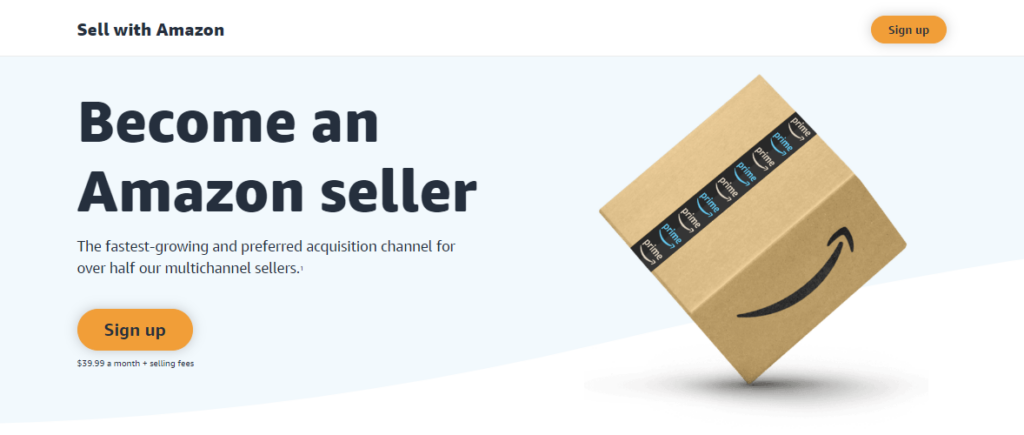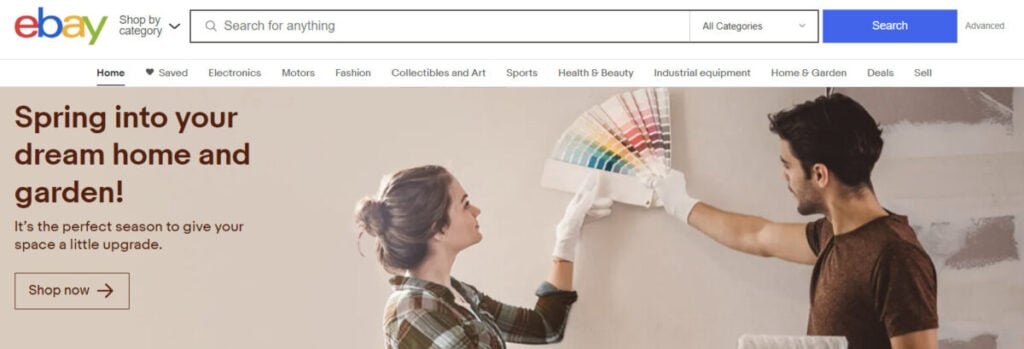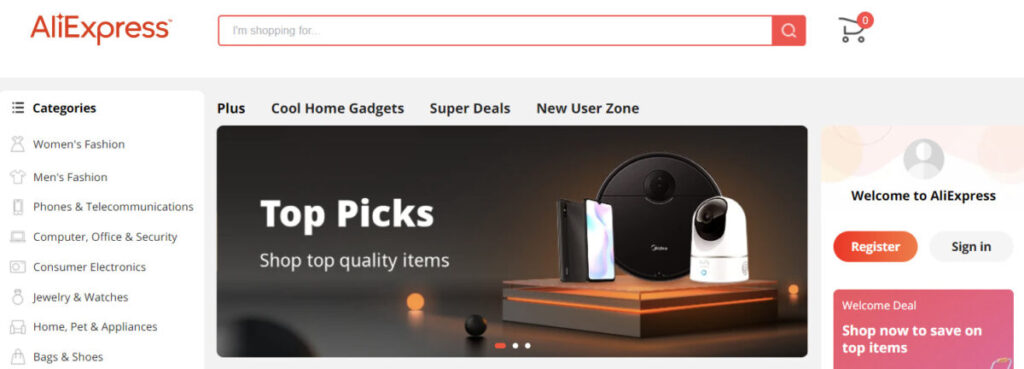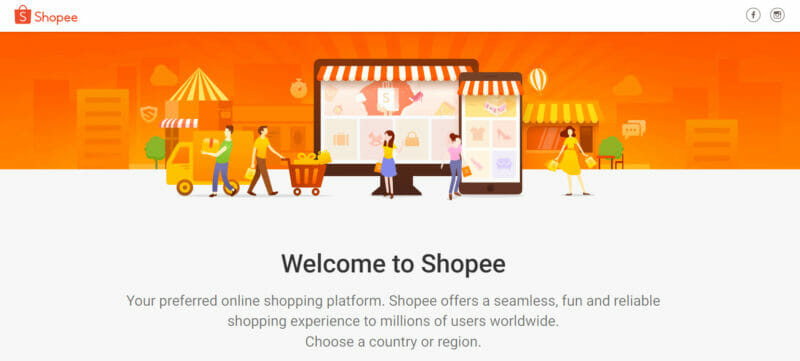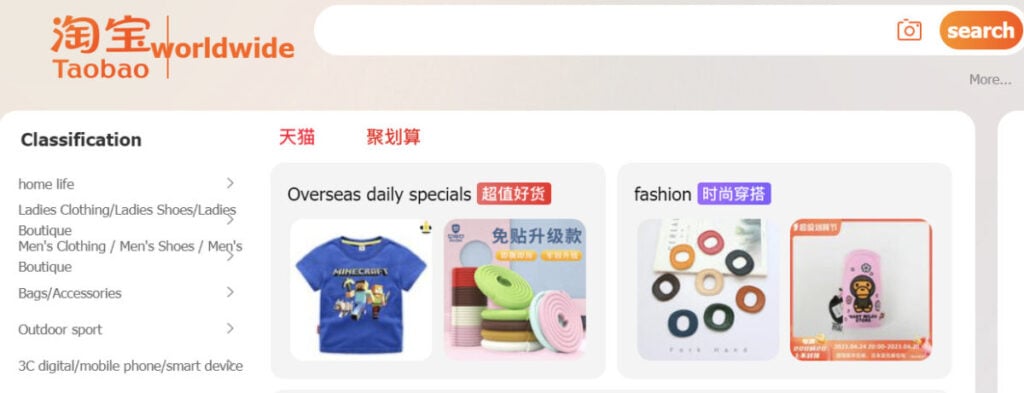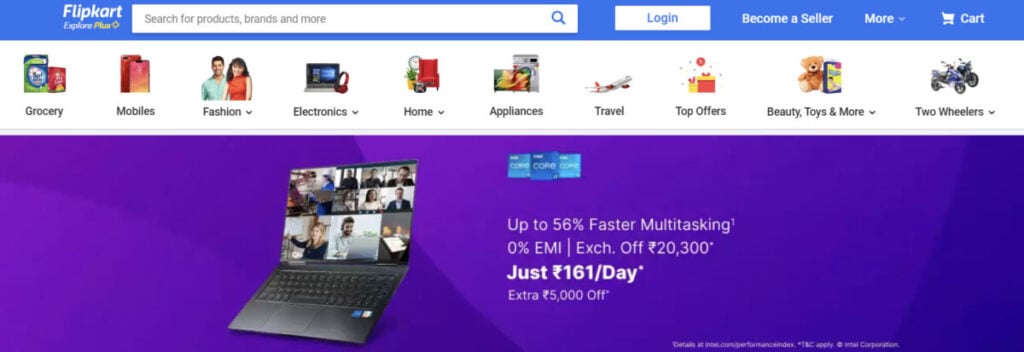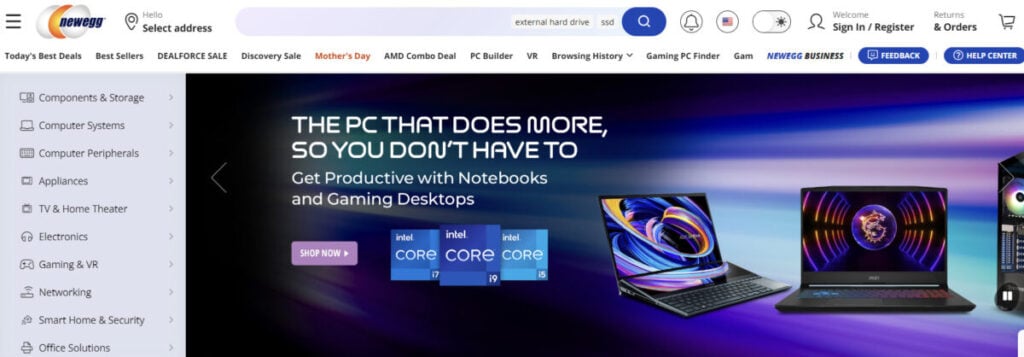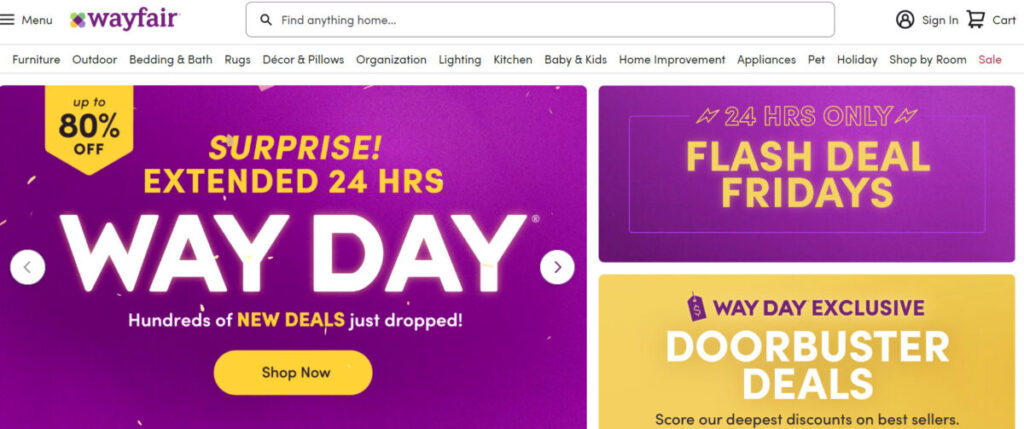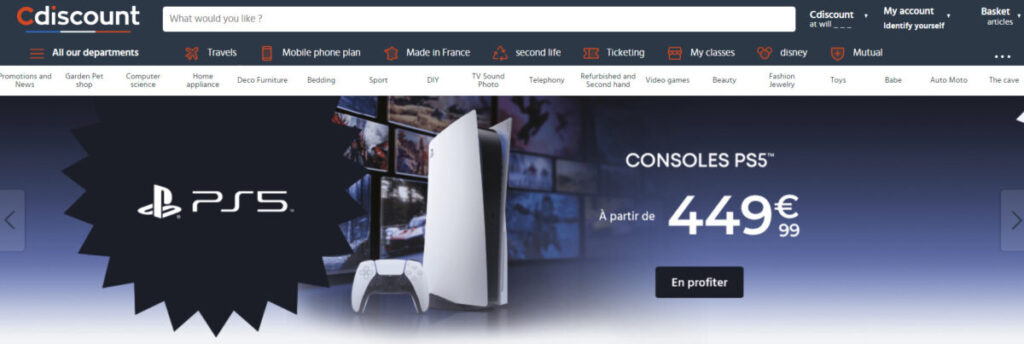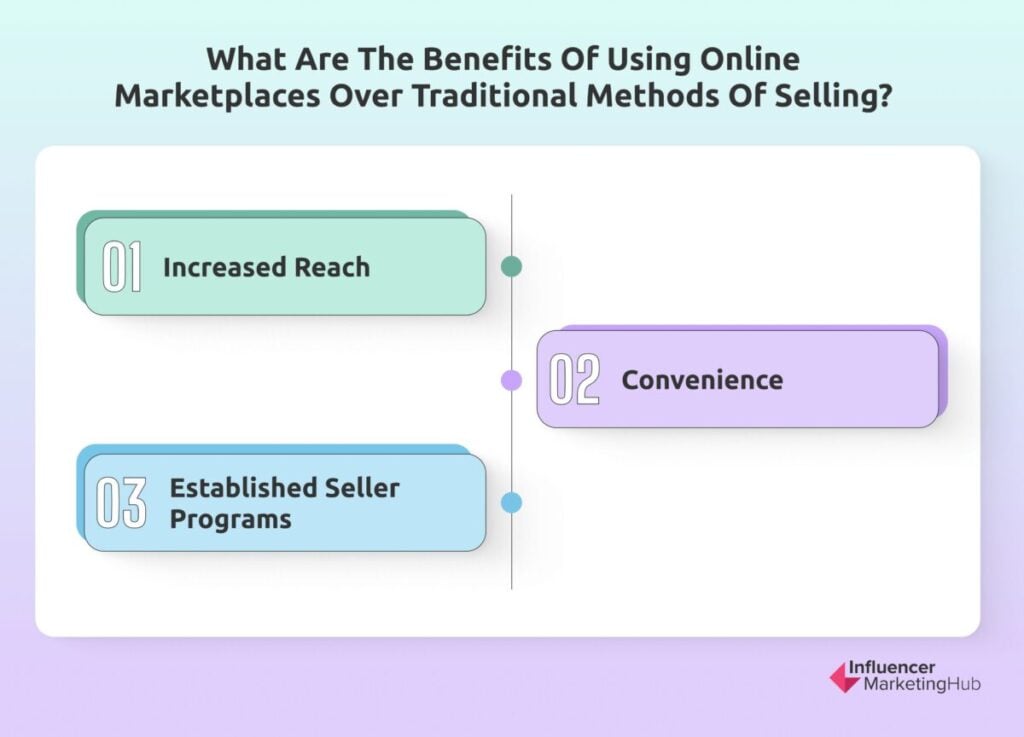While there are many different marketplaces online where you can sell your products, it can be difficult to decide which is most suitable for your business. In recent years, eCommerce has grown significantly, making up 19% of global retail sales in 2023. Moreover, projections indicate that by 2027, this figure will rise to around 25%.
This blog will discuss the 15 biggest online marketplaces as well as what makes them unique from other online marketplaces. So, whether you are an e-commerce brand or a retail seller looking to expand your audience reach, increase sales, and generate more revenue, read on to check out what could be the best online marketplace for you.
The 15 Best Online Marketplaces for E-Commerce Brands and Sellers:
- The 15 Best Online Marketplaces for E-Commerce Brands and Sellers:
- What is an Online Marketplace?
- Top Online Marketplaces for eCommerce
- What Are the Benefits of Using Online Marketplaces Over Traditional Methods of Selling?
- Best Strategies to Sell on Online Marketplaces
- Final Thoughts
- Frequently Asked Questions
What is an Online Marketplace?
Essentially, an online marketplace facilitates the exchange of goods and services between buyers and sellers. Fashion, electronics, and home goods are some of the most popular themes found in marketplaces. These sites connect buyers and sellers in one place, providing a convenient way for buyers to find what they need.
For the purpose of this article, classified ads, such as Craigslist, will be excluded from the analysis since there is no actual transaction between the buyer and seller. We will also exclude listings on Airbnb, Upwork, and Fiverr because they primarily focus on services rather than goods.
What’s important to note before we delve deeper into these individual online eCommerce marketplaces is that you’ll probably find the need to use more than one marketplace. After all, in business, it’s always a good strategy to diversify. That way, if one marketplace introduces significant changes, for instance, you won’t be impacted that much.
Top Online Marketplaces for eCommerce
1. Amazon
Among the most trusted online marketplaces, Amazon is the world's largest. The company operates in over 20 countries and has over 300 million active customers. If you are looking for a reliable place to start selling online, Amazon is a viable option. They offer a professional selling platform with features such as order management, shipping, and payments. Plus, with a variety of programs for different business types, you can find a plan that fits your budget.
Amazon carries multiple options for online sellers who want to market their products through Amazon. These include Amazon Advertising Services, Amazon FBA (fulfillment by Amazon), and Selling on Amazon Marketplace. Going on a subscription service with them will not only connect you with a gamut of third-party seller tools, but you will also have access to Amazon Cloud Services which gives sellers the ability to store items in the cloud and receive quick order fulfillment. What is more, is that their customer service is top-tier and they are always looking for ways to improve their service.
Pros:
✅ Largest customer base online
✅ Less marketing costs
✅ Higher sales
Cons:
❎ High Competition
❎ Selling Fees
❎ Complex data
2. eBay
eBay is an online marketplace that allows you to sell your goods or find them. Its global platform allows sellers to reach a much wider customer base. With so many users, eBay has become a highly-recognized brand in the industry and one of the most recognized names on the internet.
You can sell on eBay anything worth to be sold. You can use it as your online garage sale, selling the stuff you don’t need anymore. And if you have a knack for finding good deals on things, you can turn around and sell them on eBay for a profit. Moreover, you can publish a product through an auction-style listing, which will run for a set amount of time that you choose. This allows you to get the most money for your item by giving buyers the opportunity to bid on it. With reasonable fees and a wide variety of payment options, eBay is a great option for small businesses and entrepreneurs who want to earn online.
Pros:
✅ Huge customer base
✅ Auctions for top dollar
✅ Flexible pricing
Cons:
❎ High competition
❎ Fees for items over a certain price point
3. Etsy
Etsy is the place to shop for handmade items, decor, and vintage items. The platform is where small businesses and crafters can sell their original items. With almost 96 million active buyers, the app provides you with a large customer base to sell to—but it also comes with some challenges. Since there are no advertisements on Etsy, you must build your brand through positive word-of-mouth referrals and reviews from your satisfied customers. However, if you know how to market and optimize your product categories and listings and you have maintained a reasonable amount of earnings in the last twelve months, your listings can get listed offsite. If you are trying to get your products in front of an engaged and active niche community and audience, Etsy is a smart choice.
Pros:
✅ Get exposure to an engaged niche community
✅ Low cost of entry and reasonable fees
Cons:
❎ Restricted seller rights
❎ Limited marketing options
4. AliExpress
According to the latest data, Alibaba Group is the world's largest eCommerce marketplace retailer based on sales worldwide. Approximately 940 billion U.S. dollars would be generated by the platform's online sales in 2024. AliExpress, the company's top online marketplace for eCommerce brands and sellers provides an opportunity for businesses to reach new customers and sell their products globally.
Creating an online store on AliExpress is easy to do because, as an eCommerce platform, the marketplace allows sellers to list their products using categories and product types. Sellers can also choose the shipping method, payment methods, as well as pricing options. Additionally, there are helpful seller resources such as an online store builder and customer service support.
Pros:
✅ Reasonable fees
✅ Easy to use interface and store builder
✅ Ability to reach global customers
Cons:
❎ Complex language translations
❎ Long shipping times
5. Rakuten
Japan-based Rakuten is the third-largest eCommerce marketplace globally. Globally, Rakuten's 70+ businesses span eCommerce, digital content, communications, and FinTech. Business owners are able to sell their products globally without worrying about regional restrictions. You can choose from a wide variety of categories on Rakuten, whether it's accessories or home appliances. Customers-friendly features include payment processing, shipping, and product listings on the marketplace.
Aside from a responsive customer service team, sellers on Rakuten also have access to tools such as product analytics, shipping calculators, and market research tools, as well as a shopping cart for product listing management. Overall, using Rakuten for eCommerce listings is a great option for businesses looking to expand their reach online and sales worldwide.
Pros:
✅ Flexibility with pricing
✅ Global customer reach
✅ Comprehensive market research tools
Cons:
❎ Shipping and handling costs for smaller businesses
❎ More effort to market your store
6. Alibris
The Alibris marketplace offers the widest selection of books, music, and movies online. With 25 years of experience in the industry, we have been connecting millions of buyers across the world with thousands of Independent Sellers since 1998. You can support local and independent sellers when you shop at Alibris, as by doing so, you are directly supporting a local business.
Choosing to get your products listed and setup on Alibris is a great way to reach new customers, as well as drive traffic to your eCommerce store. Not only will you have access to some of the best customer service in the business, but also Alibris provides sellers with industry-leading listing tools and an active marketplace that offers seller feedback and support.
Pros:
✅ Support local and independent sellers
✅ Industry-leading seller listing tools
✅ Active marketplace with customer feedback
Cons:
❎ Limited product selection
❎ Narrow customer base
7. Shopee
Shopee is a leading e-commerce marketplace in Southeast Asia. The Singapore-based platform, founded in 2015, features thousands of vendors on both its website and mobile app. Businesses can start their online business with Shopee without worrying about listing fees. This makes it more affordable because only a commission fee is deducted from each sale.
Shopee is a suitable option for businesses looking to expand in Southeast Asia. With its easy-to-use platform and significant international presence, Shopee is a top eCommerce site that can help your business reach new heights.
Pros:
✅ Easy to set up and use
✅ Reasonable commission fee
Cons:
❎ Longer shipping times for international orders
❎ Unverifiable customer product reviews
8. Lazada
Lazada is another online eCommerce marketplace in Southeast Asia that can provide that buying experience every shopper desires. The company has a presence in Malaysia, Indonesia, Vietnam, Thailand, Singapore, and the Philippines, key countries in the region where online shopping is quite popular. Lazada also offers a wide range of categories to choose from, such as fashion, home goods, tech products, and more.
As an online store owner on Lazada, you can expect their support team to go the extra mile to help solve any issues you may have. You can also take advantage of marketplace features such as product listing, coupons and discounts, automatic shipping for orders above a certain value, and more. So, if you have products that cater to Southeast Asian shoppers and want to reach new customers online, Lazada should definitely be on your list of sites to consider.
Pros:
✅ Wide range of categories
✅ Automatic shipping for orders above a certain value
✅ Marketplace features such as coupons and discounts
Cons:
❎ Lack of a unified customer experience across the different countries
❎ Limited product options in some categories
9. Taobao
TaoBao is a Chinese online marketplace owned by Alibaba Group. It was founded in 2003 and allows businesses to sell to an audience of over 895 million monthly active users. The platform provides an easy way to facilitate consumer-to-consumer retail by allowing small businesses and individual entrepreneurs to open stores for customers residing in China who speak mainly Mandarin or Cantonese. There is a catch if you want to do business on Taobao: while store setup is easy, once you register a seller account, you need to have a registered company to do business on the site. If you feel the paperwork is worth it and the eCommerce sales of your business will be significant, Taobao is a marketplace you should definitely consider.
Pros:
✅ Easy store setup for registered companies
✅ Over 870 million monthly active users
Cons:
❎ Requires registration of a company to do business on the site
❎ Complicated customer service system
10. Flipkart
Flipkart is the leading eCommerce marketplace with the biggest market share in India. With over 430 billion Indian Rupees (around 5 billion US dollars) in revenue, it is a go-to site for over 100 million registered customers. The company was founded in 2007 by Sachin Bansal and Binny Bansal and has since expanded to include products from over 80 different categories, making it a one-stop shop for buying anything from apparel to home appliances. If you are from India and would like to begin your eCommerce journey, Flipkart makes it quite easy for even the most novice online seller to set up their store. Listings are absolutely free, and you only get charged a small commission for every item sold.
Pros:
✅ Free listings
✅ Over 100 million registered customers
Cons:
❎ No global presence beyond India
❎ Longer shipping times for orders in rural areas
11. Walmart
Walmart has long been known to operate as hypermarkets, department stores, and grocery stores all rolled into one. With a presence in over 24 countries with over 10,500 brick-and-mortar and online stores under 46 banners, it is no surprise their third-quarter revenue in 2022 was reported to be over $152 billion. If your business is based in the US and Canada, you can sign up by simply adding your business information to their application form, and you can expect to be selling within 2 weeks.
Moreover, if you already have an existing online business on Shopify, you can manage all your Walmart transactions centrally on your Shopify eCommerce website and optimize your online sales channels to drive traffic to your store.
Pros:
✅ Easy sign-up process and fast approval
✅ Manage your Walmart transactions from Shopify
Cons:
❎ Limited geographic presence outside of the US and Canada
❎ Complicated returns policy
12. Newegg
Newegg has been around for over twenty years as a marketplace for buying and selling electronics, computers, gaming hardware, and more. While most of its market is located in the US and Canada, it has expanded its global presence to the different parts of the Middle East, Europe, Asia Pacific, and South America. If you want to become a vendor on Newegg, you simply have to fill out a form and have their vetting team review your information. This allows them to ensure that your product listings are accurate and comply with their Terms of Service.
Pros:
✅ Global presence in multiple countries
✅ Easy registration process
Cons:
❎ Limited product selection compared to other top online marketplaces
❎ Strict rules and regulations regarding product listings
13. Wayfair
Wayfair is a company that has been creating and improving homes since 2011. Headquartered in Boston, USA, and Berlin, Germany, they have grown from a small-scale online marketplace of home furniture to a platform that carries anything from home accessories to appliances for every room available in your house. In addition, they have delivery and fulfillment centers across the United States, United Kingdom, Germany, and Canada, which enables you to sell your product online and have it delivered directly to the customer’s home.
If you sell furniture, appliances, or home improvement products and want to reach households, offices, or even contractors and designers, Wayfair is a worthwhile place to advertise. It's as simple as creating your product catalog, applying, and waiting. And best of all, you don't need to be based in Europe or North America. If your business meets the criteria to sell in those areas, you can list your items on the website.
Pros:
✅ International presence of delivery and fulfillment centers
✅ Wide selection of products for home improvement
✅ Easy registration process
Cons:
❎ Limited product selection compared to other top online marketplaces
❎ Limited visibility of small sellers due to the size of the competition
14. Mercado Libre
Considered to be the largest online marketplace in Latin America, Mercado Libre focuses on selling products and services to a wide variety of countries: Argentina, Mexico, Chile, and Brazil. This marketplace allows you to sell a wide range of items, including pharmaceuticals, raw materials, eco-friendly goods, and other new and used items. With over 20 years of experience in retail and now online selling, Mercado Libre is a marketplace that you should consider if selling to Latin America or the Spanish-speaking world is your business focus. Growing your market in this part of the world is now possible because the platform allows you to sell to multiple countries under just one account. Note that listing your products can be done for free. It is only once an order is placed that a shipping and transaction fee is charged.
Pros:
✅ Multiple language support
✅ Wide selection of items to sell for free
Cons:
❎ Limited overseas presence outside of Latin America
❎ Complicated interface and navigation
15. Cdiscount
The online eCommerce marketplace headquartered in France, Cdiscount is a great marketplace for selling products online. They have different categories of product listings, from home decor to clothing and accessories. Additionally, they offer services that include booking flights and accommodations, mobile subscription plans, health insurance, and tickets to a variety of shows. If you decide to subscribe as a seller on Cdiscount, you get to sell to over 23 million monthly active users. Simply register your account and submit your business documents. Once your account gets approved, pay the subscription fee and start creating your product listings.
Pros:
✅ French market presence
✅ Easy registration process and user-friendly interface
Cons:
❎ Limited product selection compared to top online marketplaces
❎ Subscription fee is required for all sellers
❎ Strict rules and regulations regarding product listings
What Are the Benefits of Using Online Marketplaces Over Traditional Methods of Selling?
With hybrid commerce (H-Commerce) on the rise, as the number of digital buyers increases, online marketplaces are becoming more popular among brands and retailers. There are several key benefits of using online marketplaces over traditional methods of selling, such as:
Increased reach
One of the key benefits of online marketplaces is the ability to reach a larger audience with minimal investment. By listing products on marketplace platforms, sellers can tap into a ready-made audience of buyers. As we've already mentioned, these marketplaces pull huge numbers of buyers. For instance, Amazon has over 300 million active monthly buyers, while eBay's numbers come to 134 million. Other popular online marketplaces have buyers in the numbers of:
- Etsy: 94 million active buyers
- Aliexpress: 150 million active buyers
- Rakuten: Over 40 million active buyers
- Alibris: Over 1.1 million active buyers
- Shopee: 295 million active buyers
- Lazada: 160 million active buyers
- Taobao: 612 million active buyers
- Flipkart: 120 million active buyers
- Walmart: 120 million active buyers
- Newegg: 40 million active buyers
- Wayfair: 21.8 million active buyers
- Mercado Libre: 218 million active buyers
- Cdiscount: 23 million active buyers
Convenience
Shopping on online marketplaces is convenient for both buyers and sellers. Buyers can browse through a wide variety of products from different brands in one place. A great example is the success story of Wish, an online marketplace known for affordable goods. Many buyers, particularly those in regions with fewer retail options, find it convenient to shop on Wish because they can access a vast array of products, often at lower prices than local stores.
On the other hand, sellers can list their products on a marketplace and have them seen by millions of potential customers with little to no effort. A notable example is the small business, Beardbrand, which started by selling grooming products through their website. By also listing their products on Amazon, they were able to reach a much larger audience.
The convenience of Amazon's logistics and fulfillment services allowed Beardbrand to focus more on product development and marketing, rather than worrying about shipping and customer service. This strategic move significantly boosted their sales and brand visibility, illustrating the convenience online marketplaces offer to sellers.
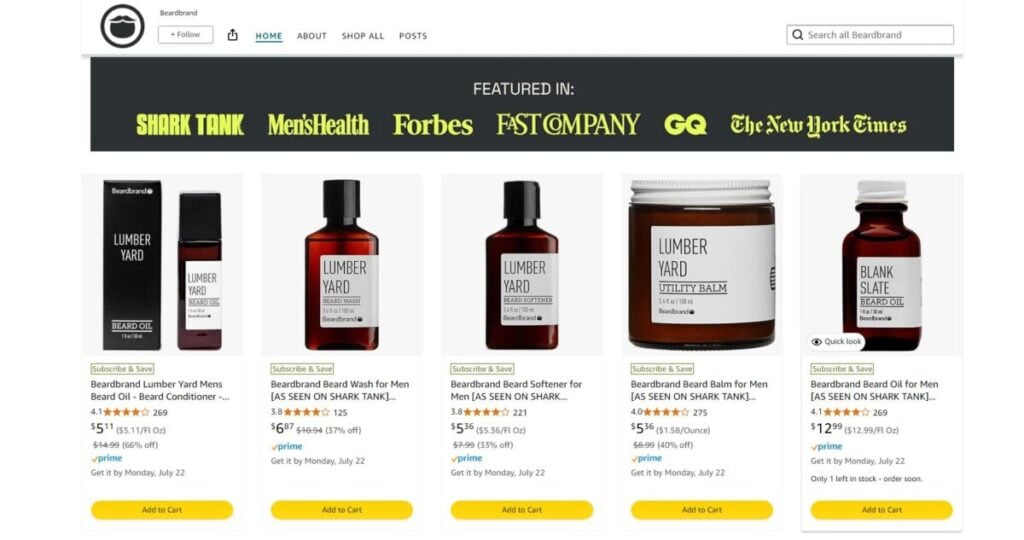
Source: Beardbrand on Amazon
Established Seller Programs
Online marketplaces often have established programs designed to help sellers thrive by providing various tools, services, and opportunities to enhance their business operations.
Amazon’s Fulfillment by Amazon (FBA) program is a prime example of a highly beneficial seller program. Through FBA, sellers can store their products in Amazon’s warehouses, and Amazon takes care of picking, packing, shipping, and customer service.
This program not only saves sellers time and effort but also significantly boosts sales. For instance, independent sellers on Amazon sold more than 4.5 billion items in 2023, averaging over $250,000 in annual sales per seller. Sellers using FBA also benefit from a 20-30% reduction in shipping costs compared to other fulfillment methods, allowing them to reinvest in their businesses and drive growth.
But that's not all. eBay’s Top Rated Seller Program rewards sellers who provide exceptional customer service. Sellers who qualify for this program receive a Top Rated Plus seal on their listings, increasing buyer trust and driving more sales. They also get discounts on final value fees and access to exclusive customer support.
eBay reported that sellers who achieve Top Rated status benefit from increased visibility and buyer confidence, which can drive more sales. Additionally, Top Rated Sellers receive a 10% discount on final value fees, enhancing their profitability. Here's a rundown of all the benefits of being a Top Rated Seller:
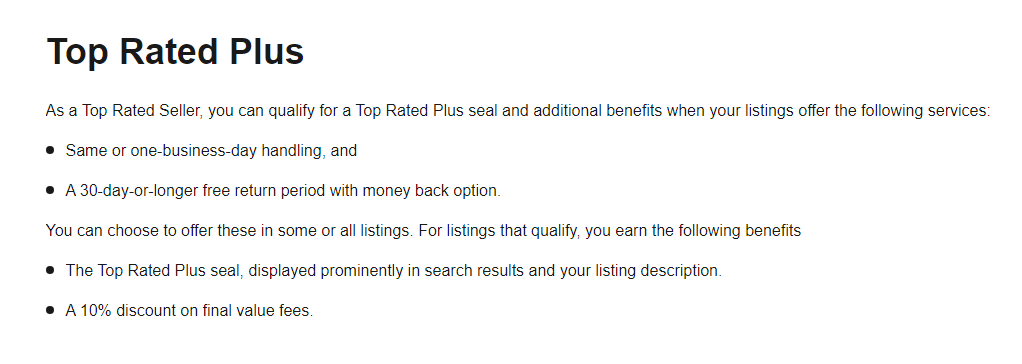
Source: eBay
Best Strategies to Sell on Online Marketplaces
To maximize your success on online marketplaces, it's essential to implement effective strategies that will help you stand out from the competition, attract more customers, and increase your sales. Here are some of the best strategies to consider:
Optimize Your Listings
Ensure your product listings are complete, accurate, and compelling. Use high-quality images, detailed descriptions, and relevant keywords to improve visibility in search results. Highlight unique selling points and benefits to entice potential buyers. Here's how the official Apple Store on Amazon optimized their listing for the Apple Watch Series 9.
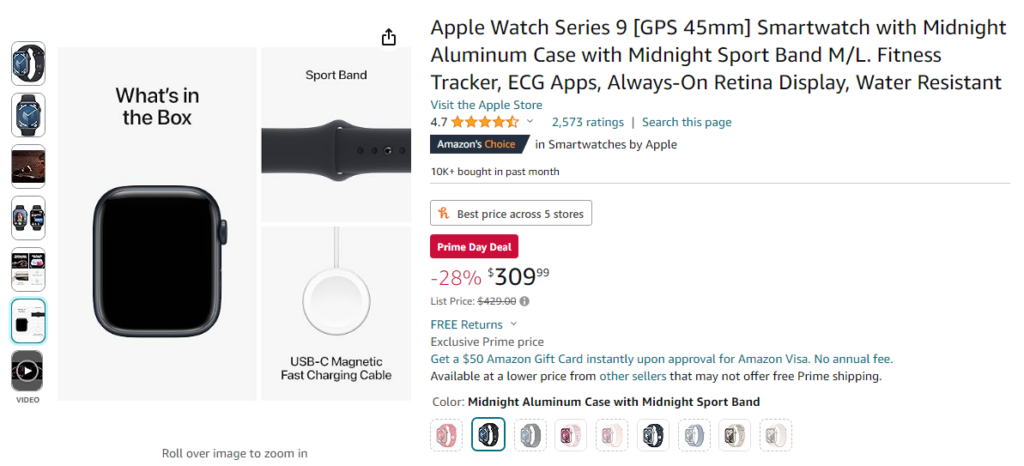
Source: Apple on Amazon
As you can see from the image above, the first thing you see is the product name, accompanied by a description of its core features through the use of keywords. On the left, you'll see a host of high-quality images potential buyers see. Finally, the product listing is accompanied by a detailed product description, diving into its main selling points.
Leverage Multiple Marketplaces
Diversifying your presence across multiple marketplaces can help you reach a broader audience and reduce dependence on a single platform. This approach also mitigates risks associated with policy changes or marketplace-specific issues that could impact your sales. Known for its electronics, Anker diversified its sales channels by selling on Amazon, eBay, and its own website. This multi-channel approach helped Anker reach a broader audience and mitigate risks associated with relying on a single platform.

Source: Anker on Amazon
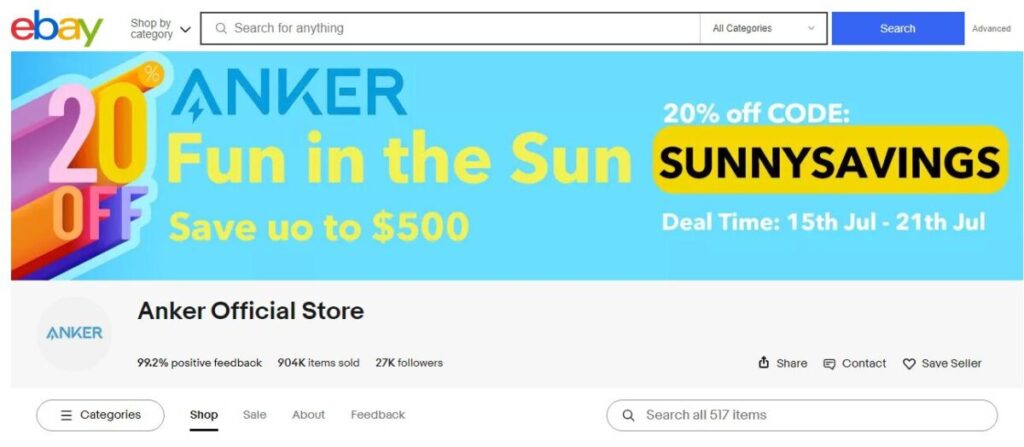
Source: Anker on eBay
Utilize Marketplace Tools and Programs
Take advantage of the tools and programs offered by marketplaces, such as Amazon's Fulfillment by Amazon (FBA) and eBay's Top Rated Seller Program. These programs can streamline your operations, improve customer satisfaction, and increase your sales potential.
Monitor and Analyze Performance
Regularly monitoring and analyzing your performance is crucial for success on online marketplaces like Walmart. This involves keeping a close eye on sales metrics, customer feedback, and other key performance indicators (KPIs) to make informed decisions that optimize your business operations. By continuously reviewing these metrics, you can identify areas for improvement and adapt quickly to changing market conditions, ensuring sustained growth and profitability.
Provide Excellent Customer Service
Final Thoughts
These different online marketplaces are a great way for businesses and sellers to reach a wider audience, boost sales, and increase profits. It all boils down to this: online marketplaces will continue to thrive as consumers continue to search for convenient, affordable, and quality products with just the tap of a button. With the trend of online shopping continuing to grow, online marketplaces will only continue to increase in popularity and importance.
Using online marketplaces offers several benefits, including: When choosing an online marketplace, consider the following: Some of the top online marketplaces include: To maximize success on online marketplaces: Yes, some disadvantages include:Frequently Asked Questions
What are the benefits of using online marketplaces for e-commerce brands and sellers?
What should I consider when choosing an online marketplace for my e-commerce business?
What are some of the top online marketplaces for e-commerce brands and sellers?
How can I maximize my success on online marketplaces?
Are there any disadvantages to selling on online marketplaces?
